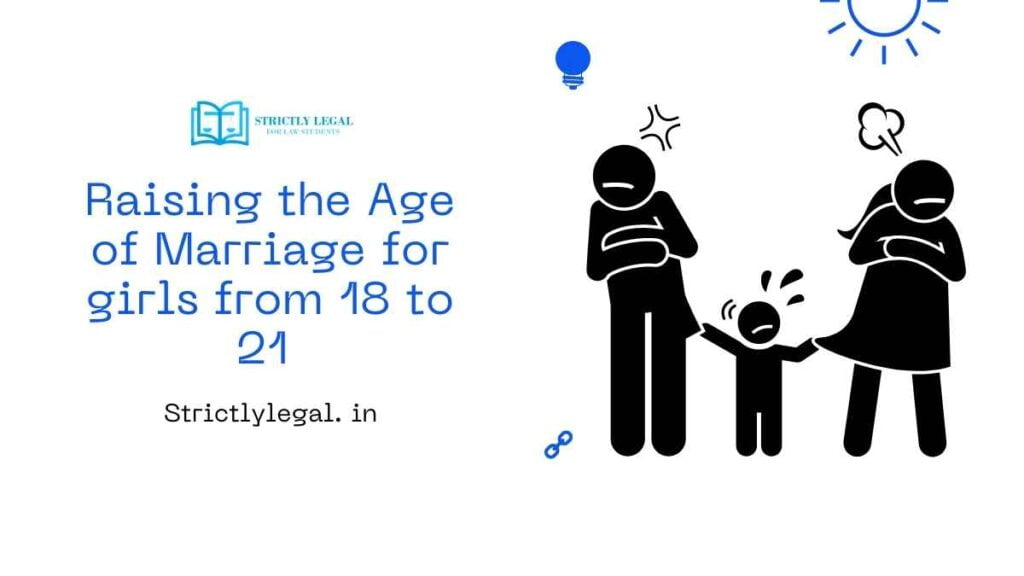India is a developing nation and the social reforms are underway to make our nation a more developed one. As a consequence, a significant move has been put forth by the government. The initiative to raise the legal minimum age of marriage for women from 18 to 21 has been approved by the Union Cabinet, and an amendment to the Prohibition of Child Marriage Act will be introduced.
This Article was submitted by: Poorvi Avtar, 3rd year Law student.
As of now, the bill has been referred to the Parliamentary Standing Committee. Furthermore, in relation to this bill, the Hon’ble Prime Minister stated that “We are doing this to give girls more time to study and progress. This is a decision that the country is making for its daughters” This move is a great step towards women’s empowerment. Everyone talks about women empowerment, but few actually do anything about it. A girl’s education, financial independence, and other opportunities are all taken away when she marries as a child. If we truly want to achieve gender equality, then such measures must be adopted. Furthermore, if this bill is passed by parliament, certain amendments to personal laws would be required, which is the next big task to be performed.
> Read: Did you know about the Devadasi cuture in India?
Table of Contents
Why do we need such amendment?
Child marriage has always been one of the major issues that India is facing. The law establishes a minimum age for marriage in order to effectively prohibit child marriage and protect children from abuse. Early marriage and, as a result, early pregnancies have an impact on mothers’ and children’s nutritional levels, as well as their overall health and mental well-being. It has also impacted Infant Mortality Rate and Maternal Mortality Rate. When a young female gets pregnant, it increases the risk of high blood pressure, anemia, and a variety of other health problems in the mother, as well as serious pregnancy complications that can result in the mother’s death. According to National Family Heath Survey, 23.3% of women aged 20 to 24 were married before they turned 18. About 6.8% of women in the age group of 15-19 years were already mothers or pregnant at the time of the survey.
Furthermore, as we know, child marriage is widespread in rural places where the significance of education has yet to be realised. Several girls who marry at a young age are forced to abandon their studies, resulting in their education not being finished. Hence, to change the current situation, even in rural areas, a reform is required that will assist in the complete abolition of child marriages.
Positive impact of the proposed amendment
The initiative taken by the government to increase the legal minimum age of marriage for girls is a step ahead towards achieving gender equality. Because 18 is such a young age to marry, it is a time when girls begin to dream about a brighter future. Females have yet to develop an understanding of what is right and wrong at this age, but they are expected to take on the enormous responsibility of marriage. Therefore, it is a huge step for women’s empowerment.
Further, delay in marriage may have a favourable economic, social, and health impact on families, women, children, and society at large. As a result, raising the age of marriage for girls could help reduce the maternal mortality rate. According to studies, early marriages can lead to mental health concerns, so raising the legal age will minimise the risk of mental health issues among young bride.
Some females who marry before the age of 18 do not have financial independence. In such circumstances, women are completely dependent on their husbands for existence. Because of their dependency, they are compelled to continue in the relationship, even if it is abusive. As a result, extending the legal marriage age can empower women and assist them in gaining financial independence prior to marriage.
Also, it’s a fact that if you educate a man, you educate an individual. But if you educate a woman, you educate a nation. But in current times, many young women are forced to abandon their studies in order to marry. As a consequence, raising the legal marriage age to 21 will allow them to complete their studies. Hence, in the future, we will witness a greater number of women pursuing higher education.
Criticism
Every new change has its own pros and cons attached to it. This amendment also has some criticism. They are discussed below-
1) Personal law amendments: If the bill is passed by Parliament, personal law amendments will be required. Personal laws which specify the minimum age of marriage as 18 years are-
1)The Hindu Marriage Act,
2)the Indian Christian Marriage Act, wese laws, Acts like the Hindu Minority and Guardianship Act, 1956’; and ‘Hindu Adoptions and Maintenance Act, 1956’ also need to be amended. It will be a difficult task to execute because anything that impacts personal laws is not readily accepted.
2) Already Reduction in the number of child marriages: According to NFHS data, early marriage rates in India fell from 47 percent in 2005-06 to 27 percent in 2015-16. In addition, India’s median marriage age grew from 16.7 years in 1998-99 to 17.2 years in 2005-06 to 19 years in 2014-15This is due to the government’s increased emphasis on girls’ education. So, rather than increasing the age for marriage, the government should focus more on girls’ education and, as a result, cases of child marriage will automatically fall.
3) Non effectiveness of Prevention of Child Marriages Act (PCMA)- It has been observed that the current law, i.e., PCMA, is not very effective, as incidences of child marriage continue to occur. Even when the age of marriage for females was raised from 16 to 18 years, it was still not enough to avoid a considerable number of cases. Hence, it makes no difference if the age of marriage for girls is raised from 18 to 21.
Way forward
Women-centric reforms can bring holistic change. Raising the legal age of marriage for girls is a good start, but more needs to be done. We must provide greater opportunities for women; otherwise, we will not be able to eradicate forced marriage. The following are additional measures which need to be taken care of-
1) It has to be kept in mind that legislation must be properly implemented. This is the responsibility of both the legislative and executive bodies. The legislative body needs to make proper laws and the executive body needs to take care of the execution of those laws. We have seen that the current PCMA statute is ineffective, so we must remember that history does not repeat itself.
2) In order to achieve gender equality in its complete sense, we must also focus on girls’ education. We should implement more reforms to educate women so that they can take decisions for themselves.
3) Raise awareness about the negative impact of child marriage for women. It is the government’s responsibility to educate a family about the negative consequences of child marriage. The government should run a public awareness campaign, particularly in rural regions, to convince people that child marriage is not a good idea.
4) Poor families should be economically supported by the government since they are not financially self-sufficient, which is one of the reasons girls get married young.
Conclusion
Raising the legal age of marriage for girls from 18 to 21 is a great step forward. Overall, it is a positive step towards women’s empowerment. In order to maximise the benefits of this reform, we should also focus on other issues which are crucial for women like education, health, etc. There is still a long way to go, and we must work hard every day to ensure gender equality.

Users not registered with Strictlylegal can Email us their content and the same are posted through this account. In case of abuse, kindly let us know at [email protected]





